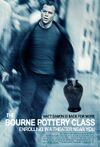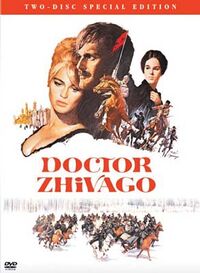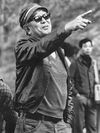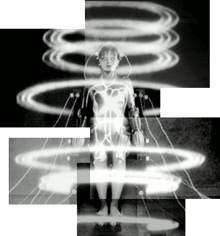Portal:Film
| Welcome to Uncyclopedia's Film portal. |
Film is an important mechanism; films entertain, misguide, confuse, and distract audiences, thus producing a society of sheep that industry and politics require on to keep those dollars rolling in. However, to avoid panic, it's commonly just lumped under the category of art.
The visual elements of cinema need no translation, giving the motion picture a universal power of communication. This is why that breasts, explosions, and car chases are as deeply cherished and understood in the United States as they are in Wherethefrickistan.
Films are also artifacts created by specific cultures, which reflect those cultures, and in turn, affect them. It is commonly agreed however that none of these will be worth digging up and featuring in the Smithsonian, regardless of the number of years old.
Traditional films are made up of a series of individual images called frames. When these images are shown rapidly in succession, a viewer has the illusion that motion is occurring. The viewer cannot see the flickering between frames due to a combination of physiological and psychological effects. One is known as persistence of vision — whereby the eye retains a visual image for a fraction of a second after the source has been removed. The other is known as hooch — whereby audiences sneak in potato vodka and other homemade alcohol under their jackets, to save money at the concession and to increase the enjoyment of the movie.
The origin of the name "film" comes from the fact that photographic film (also called film stock) has historically been the primary medium for recording and displaying motion pictures. Many other terms exist for an individual motion picture, including picture, picture show, photo-play, flick, and most commonly, movie. Additional terms for the field in general include the big screen, the silver screen, the cinema, and the movies.
| More about Film... |
Selected article
The Bourne Pottery Class is the fourth film in the popular Jason Bourne series, starring Matt Damon. The film tells the epic tale of Jason Bourne, the ex-CIA assassin, as he enrolls in a pottery class and learns to make ceramic pots and pans. The film was hailed by critics as "one of the most thrilling depictions of ceramic plate-making since the James Bond movie from the '80s, 'The Spy who Helped Glaze my Clay Vase.'"
The film picks up directly where the last installment, the Bourne Ultimatum, left off--with Jason Bourne swimming in a New York river after falling approximately eight miles from a nearby skyscraper. Bourne swims to the shore and sees a building marked "Mrs. Wheeler's Pottery School." He walks inside, as extremely loud, guitar-driven industrial music plays in the background. The camera shakes dramatically as the first of many exhilarating sequences begins. Bourne tries to enroll in the class, but Mrs. Wheeler (Winona Ryder) wants to charge him $20 an hour. He says this is outrageous. As they argue, the camera shakes violently to the point that it is no longer possible to tell what is going on onscreen because it is an incomprehensible blur.
It then moves into the first of several pottery scenes. "Our pottery scenes are 100% real," boasted the director of the film, Doug Liman, "We used no stuntmen or CGI effects, no matter how difficult it made production." As Bourne moves from one pot to another, spinning his pottery wheel and moulding the clay, the cameraman runs around the room, shaking the camera vigorously for dramatic effect. The film then enters what many critics hailed as one of the best chase scenes in the series. Bourne picks up a small slip (a piece of clay mixed with water) to add a finishing touch to one of his urns when he drops it on the ground. He runs after it in a three second chase scene that ends with the slip splitting in two in "One of the most realistic pottery-chase scenes ever filmed."
Selected picture
What's On?
2001: A Space Odyssey • Albanian interpretationalist cinema • Blade Runner • Carry On Films • Donnie Darko • Dr. No • Eadweard Muybridge, Zoopraxographer • Eraserhead • G Rated Talking Animal Movie • Passion of the Christ 2 • Pirates of the Caribbean • Robert's Rules of Order: The Movie • Surprise Ending • Terminator • The Wizard of Oz • You Don't Mess with the Zohar •
Categories
Selected biography
Akira Kurosawa was a Japanese filmmaker best known for his many samurai films and period pieces. Kurosawa was one of the most important and influential filmmakers in history, and influenced directors like George Lucas, Francis Ford Coppola, Steven Spielberg, Sergio Leone, and Quentin Tarantino. At one point, Kurosawa was considered one of the greatest directors of all time. However, this former consensus pegging Kurosawa as one of the greatest—if not the greatest—filmmaker of all time has recently changed. The work and studies of a new generation of film scholars—most notably Timmy Brenton (age 14) and Stacy Summers (age 19)—has brought to light a number of flaws inherent in all Kurosawa films. For instance, Timmy Brenton observes that Kurosawa's films are completely devoid of “special effects, explosions, violence, or hot girls,” and instead focus on boring things like “the plot” and character development. Stacy Summers—in regards to the social commentary the pervades many Kurosawa films—has made the observation that such things are “boring” and that she'd “rather just watch The Hills.”
News
Did you know...
- Nicolas Cage started life as Nicholas Coppola, but became known by his current surname because famous film director Uncle Francis Ford Coppola used to keep him confined for protection. Ours. There's no official explanation as to how he was released, but the results have only confirmed Coppola's original wisdom.
Things you can do
Featured content
Main topics
Terms - Animation • Beta movement • Camera • Cult film • Digital cinema • Documentary • Experimental film • Fan film • Film criticism • Film festival • Film journals and magazines • Film industry • Film theory • History of film • Lost film • Narrative film • Open content film • Persistence of vision • Photographic film • Propaganda • Silent film • Sound stage • Web film • World cinema
| L.A. Confidential |








